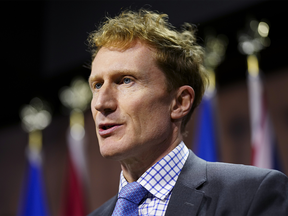Not enough domestic workers available to sustain parts of the economy, lobby groups argue

Article content
Canada’s immigration minister is taking steps to curb the country’s dependence on temporary foreign labour and international students, prompting pushback from business groups that say there aren’t enough domestic workers available to sustain parts of the economy.
Marc Miller introduced a limit on foreign student visas last month, cutting them by 35 per cent for this year. He will announce further changes soon to restrict students’ off-campus work hours and he’s also reviewing the country’s temporary foreign worker program, he told Bloomberg News in an interview.
Advertisement 2
Article content
Article content
“We have gotten addicted to temporary foreign workers,” Miller said. “Any large industry trying to make ends meet will look at the ability to drive down wages. There is an incentive to drive labour costs down. It’s something that’ll require a larger discussion.”
The minister is wrestling with a surge of foreign students and temporary workers that has helped drive up housing costs, sparking a backlash against Prime Minister Justin Trudeau’s government. Miller’s challenge is balancing economic needs with preserving the country’s relatively orderly immigration system, which has seen a loss of public support in recent months.
While the United States and many European countries are grappling with a surge in undocumented migration, Canada’s geography has allowed it to keep better control over population inflows. But the country instead is nevertheless struggling to cope with increases in temporary newcomers, who’ve arrived to work in farms and factories, or study at its colleges and universities while also working.
Statistics Canada estimates there are more than 2.5 million non-permanent residents, over six per cent of the population, and they play a key role in filling the labour-force gaps left by an aging population. But rapid growth, particularly in the student population, has led to soaring rents and house prices, hurting Trudeau’s popularity.
Article content
Advertisement 3
Article content
Miller’s first step was tightening the rules on students. In addition to capping student visas, he ended a policy that allowed spouses of foreign students to gain work permits and introduced new restrictions on work permits available after graduation.
He’s now turning his attention to a temporary measure that has allowed students to work as much as 40 hours a week off campus. The policy was introduced in 2022 in response to pandemic-related labour shortages. More than 80 per cent are now working more than 20 hours a week, Miller said. Still, he defended the move as necessary at the time, and said the new rule will likely allow more than 20 hours of work, but less than 40.
Miller said he’s working with Employment Minister Randy Boissonnault to review the temporary foreign worker program, which allows firms to bring in employees from abroad on time-limited visas. The minister declined to elaborate, but said he’s concerned about abuse in some lower-wage sectors.
“I will have to be a little more surgical than I have in prior steps I’ve taken,” Miller said. “There are consequences to taking a decision that would limit that flow of people for businesses, for the economy.”
Advertisement 4
Article content
Dan Kelly, president of the Canadian Federation of Independent Business, said the government appears to be in “panic mode” and making sweeping changes without thinking through the ramifications, particularly for smaller and rural communities that have come to rely on migrants to work and to buy goods and services.
“I worry that we may be scapegoating the temporary foreign worker program and the international student program to too great a degree and thinking that this is some big panacea or big fix,” Kelly said.
Companies are already lobbying against the planned reduction in permitted work hours for students, Miller said. “Some of the big-box stores, some of the businesses that have international students, have pushed relatively hard to preserve the 40-hour work week,” Miller said. “Some student groups call for it as well because a lot of employers want you to be able to commit to more than 20 hours.”
The Retail Council of Canada wants a permanent regulation allowing 30 hours of work per week when class is in session. “For international students, retail can provide a way to supplement their incomes, enhance language skills, and provide useful employment skills – everything from front-line retail and customer service, to logistics and supply chain,” spokeswoman Michelle Wasylyshen said in an email.
Advertisement 5
Article content
Canada stands ready to shoulder the economic impact of limiting temporary migration, Miller said. High levels of immigration have helped keep Canada’s economy growing despite the sharp rise in interest rates. But the increase in migration has also contributed to inflation, and many foreign students are not getting the experience they were promised by colleges that are exploiting them for profit, Miller said.
Recommended from Editorial
-

Forget the war on immigration: Societies need foreign workers
-

B.C. freezes OK for new schools seeking to enrol foreign students
-

Ontario to require schools to guarantee foreign student housing
“The question we posed to ourselves is: do we want that short-term gain for a lot of long-term pain?” he said, adding that some colleges have been relying on “fast money” that harms young people and their families. “Institutions that have profiled models of growth that are no longer tenable will perhaps have to shut down if it’s done properly.”
—With assistance from Brian Platt, Erik Hertzberg and Laura Dhillon Kane.
Bloomberg.com
Article content
Canada must end reliance on cheap foreign labour, minister says
2024-02-06 16:27:34






